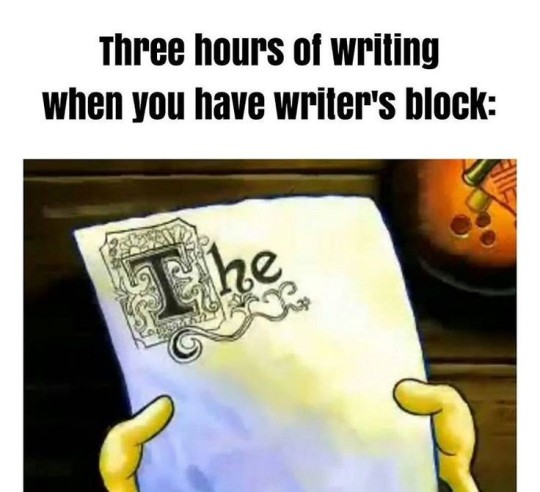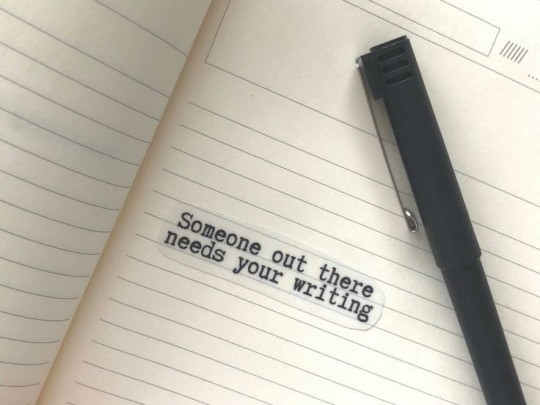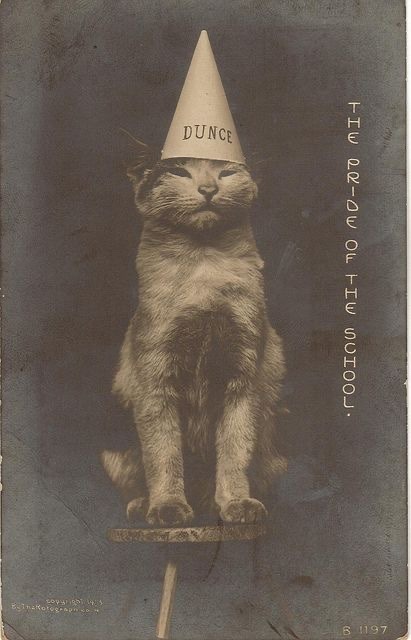#writersnetwork
Text
Types Of Writer’s Block (And How To Fix Them)
1. High inspiration, low motivation. You have so many ideas to write, but you just don’t have the motivation to actually get them down, and even if you can make yourself start writing it you’ll often find yourself getting distracted or disengaged in favour of imagining everything playing out
Try just bullet pointing the ideas you have instead of writing them properly, especially if you won’t remember it afterwards if you don’t. At least you’ll have the ideas ready to use when you have the motivation later on
2. Low inspiration, high motivation. You’re all prepared, you’re so pumped to write, you open your document aaaaand… three hours later, that cursor is still blinking at the top of a blank page
RIP pantsers but this is where plotting wins out; refer back to your plans and figure out where to go from here. You can also use your bullet points from the last point if this is applicable
3. No inspiration, no motivation. You don’t have any ideas, you don’t feel like writing, all in all everything is just sucky when you think about it
Make a deal with yourself; usually when I’m feeling this way I can tell myself “Okay, just write anyway for ten minutes and after that, if you really want to stop, you can stop” and then once my ten minutes is up I’ve often found my flow. Just remember that, if you still don’t want to keep writing after your ten minutes is up, don’t keep writing anyway and break your deal - it’ll be harder to make deals with yourself in future if your brain knows you don’t honour them
4. Can’t bridge the gap. When you’re stuck on this one sentence/paragraph that you just don’t know how to progress through. Until you figure it out, productivity has slowed to a halt
Mark it up, bullet point what you want to happen here, then move on. A lot of people don’t know how to keep writing after skipping a part because they don’t know exactly what happened to lead up to this moment - but you have a general idea just like you do for everything else you’re writing, and that’s enough. Just keep it generic and know you can go back to edit later, at the same time as when you’re filling in the blank. It’ll give editing you a clear purpose, if nothing else
5. Perfectionism and self-doubt. You don’t think your writing is perfect first time, so you struggle to accept that it’s anything better than a total failure. Whether or not you’re aware of the fact that this is an unrealistic standard makes no difference
Perfection is stagnant. If you write the perfect story, which would require you to turn a good story into something objective rather than subjective, then after that you’d never write again, because nothing will ever meet that standard again. That or you would only ever write the same kind of stories over and over, never growing or developing as a writer. If you’re looking back on your writing and saying “This is so bad, I hate it”, that’s generally a good thing; it means you’ve grown and improved. Maybe your current writing isn’t bad, if just matched your skill level at the time, and since then you’re able to maintain a higher standard since you’ve learned more about your craft as time went on
#writing#writers#writeblr#bookblr#book#writers on tumblr#writerscommunity#writers of tumblr#writer#how to write#on writing#creative writing#writers block#write#writing tips#writers and poets#writblr#female writers#queer writers#writer things#writer stuff#writing is hard#writing advice#writing life#writer problems#writerscreed#writersnetwork#writerblr#writersociety#writerslife
2K notes
·
View notes
Text
I felt this.

#writers block#books#writing#writersnetwork#writers#writers on tumblr#writing community#author#writers life#writerscommunity#writer#writers and poets#writeblr#writing process#writers of tumblr
2K notes
·
View notes
Text
Staying motivated and continuing to work on your story, even when you're not actively writing, can be challenging but essential for your creative process. Here are some tips to help you stay engaged with your story:
Remember Your Why: Reflect on why you started writing this story in the first place. Reconnect with your passion and purpose.
Set Clear Goals: Define specific goals and milestones for your story. Knowing where you're headed and what you want to achieve can help maintain your motivation.
Visualize Your Story: Create visual aids like character mood boards or plot diagrams. Visualizing your story can make it feel more real and inspire creativity.
Create Character Playlists: Develop playlists of songs that evoke the emotions and personalities of your characters. Listening to these playlists can immerse you in your story world.
Explore Backstories: Dive into your characters' pasts. Writing short stories or character profiles can deepen your understanding of their motivations and add depth to your narrative.
Experiment with Prompts: Use writing prompts unrelated to your story to keep your creativity flowing. You might stumble upon ideas that you can incorporate into your narrative.
Write Out of Order: Don't feel constrained to write your story sequentially. If you're excited about a particular scene or chapter, go ahead and write it. You can connect the pieces later.
Keep an Idea File: Maintain a digital or physical file where you store story ideas, quotes, and images that inspire you. Reviewing these can reignite your creativity.
Write Letters from Characters: Compose letters or journal entries from the perspective of your characters. It can help you explore their voices and viewpoints.
Reward Creativity: Treat yourself when you achieve creative breakthroughs. Acknowledging your achievements can reinforce your dedication to your story.
Remember that every writer's journey is unique, so don't be discouraged by occasional dips in motivation. Embrace these strategies and tailor them to fit your writing style and preferences. Most importantly, enjoy the process of storytelling, and your enthusiasm will naturally shine through in your work.
Did you find this useful? Please, consider sending me feedback or buying me a coffee. If you would like to request something (either advice or a piece of a story) for me to write it, go and message me. Also, if you'd like, you can check my masterlist. Happy writing!
#writing advice#writeblr#uservolkova#writersnetwork#writers on tumblr#writers block#writerscommunity#writers of tumblr#writer problems#writer things#creative writing#writing community
458 notes
·
View notes
Text
Maybe it is the distance that keeps me close to you, The yearn for your touch, the constant need of your love, something to imagine, something to dream. Maybe that is us, maybe that’s all we keep colouring as love.
#relatable#spilled words#poets on tumblr#words#spilled thoughts#spilled ink#foryou#foryoupage#fyp#word of the day#books libraries#writerscorner#writerscommunity#writers on tumblr#writersnetwork#writerslife#my words#my writing#writing blog#my wriitng#new poets society#writeblr#writers block#writers of tumblr#poems and poetry#poems on tumblr#dark academia#classic academia#romantic academia#light academia
115 notes
·
View notes
Text
We want to stay together today. Which would be better, the joy of seeing each other again or the sadness of parting?
—Vincent Van Gogh
#literature#spilled words#writers on tumblr#van gogh#vincent van gogh#poetrycommunity#vintage academia#dead poets society#emily bronte#sylvia plath#books & libraries#writeblr#desiblr#free write#writersnetwork#september
78 notes
·
View notes
Text
August has always been the most distressing month in the year. The emotions are wild and untamed, the hunches keep haunting you, your heart reminds you of who you love so deeply and your mind warns you that it may not end so well.
#excerpt from a book i'll never write#spilled thoughts#excerpts#young writer#spilled words#female poets#crescent moon#poetry#female writers#spilled emotions#poetsandwriters#writerscorner#spilled ink#moonchild#literature#writersnetwork#quotes#poets of tumblr#writers and poets#night
593 notes
·
View notes
Text
You were the best thing that happened to me, I am going around places and doing things that take me one step closer to our dream and I don’t mention you as often as I used to, I don’t tell people how I loved you and still do but I talk about something else instead. I say I have a lot, so I really do and I barely get moments to catch feelings, I barely get moments to breathe your name. You have always been the best thing that happened to me, and I don't talk about us as often but a part of me wants to keep you with me, alive in every moment. I don't know how to unlove you and I won't.
- trustonlystars | Jannie F
#writerscreed#spilled thoughts#excerpt from a book i'll never write#spilled ink#excerpt from a story i'll never write#trustonlystars#poetryportal#bitsofstarglow#writtenconsiderations#quotes#spilled poetry#poetic stories#poetrypardy#spilled tears#spilled love#writersnetwork#tumblr writers#writers of tumblr#excerpts from my writing
69 notes
·
View notes
Text
Creating a Royal Character for Your Fiction Novel | Short Guide

When it comes to writing a royal character for your fiction novel, there are a few key elements that you should keep in mind. Whether your character is a king, queen, prince, or princess, they need to be believable and relatable to your readers. In this blog post, I’ll help you explore some tips and tricks for creating a royal character that your readers will love.
Research
Before you start writing your royal character, it’s important to do your research. This means studying the history and culture of the time period and setting in which your novel takes place. If your story is set in a medieval kingdom, for example, you’ll need to understand the social customs and political structures of that time.
You should also research real-life royal figures for inspiration. Look at their personalities, strengths, and weaknesses, and think about how you can incorporate these traits into your own character.
Personality
Your royal character’s personality is perhaps the most important aspect of their character. They should be complex, multi-dimensional, and relatable. One way to achieve this is to give them flaws and weaknesses, just like any other character. Perhaps they struggle with a temper, or they have a tendency to be too trusting of others.
At the same time, your royal character should also have strengths and admirable qualities. They may be brave, intelligent, or compassionate. Think about what makes your character unique and what sets them apart from other royal characters in literature.
Relationships
No character exists in a vacuum, and your royal character is no exception. Think about the relationships they have with other characters in your novel. Do they have a spouse or children? Do they have close advisors or friends? How do they interact with the common people in their kingdom?
These relationships can help to flesh out your royal character and make them more relatable to your readers. They may also provide opportunities for conflict and tension within your story.
Dialogue
The way your royal character speaks is also important. They should have a distinct voice that sets them apart from other characters. If they are a king or queen, for example, they may speak in a more formal and regal tone. If they are a prince or princess, they may have a more youthful and casual way of speaking.
At the same time, it’s important to make sure that your royal character’s dialogue is believable. They should speak in a way that is consistent with their personality and background.
Appearance
Your royal character’s appearance can also play a role in their character development. Think about how their appearance reflects their personality and status. A queen may wear regal clothing and jewelry, while a prince may dress more casually.
You should also think about how your character’s appearance changes throughout the story. Do they become more regal as they take on more responsibility? Do they become disheveled as they struggle with their duties?
Conflict
Finally, it’s important to give your royal character a compelling conflict to face. This conflict should be related to their role as a royal, and it should challenge their beliefs and values. Perhaps they must choose between their duty to their kingdom and their love for a commoner. Or maybe they must navigate a political crisis that threatens their reign.
Whatever conflict you choose, make sure it is meaningful and drives the story forward. It should also provide opportunities for your character to grow and change.
Checklist (For All You Writers)
Research the history and culture of the time period and setting in which your novel takes place.
2. Research real-life royal figures for inspiration.
3. Develop a complex personality for your character by giving them flaws and weaknesses, as well as strengths and admirable qualities.
4. Consider the relationships your character has with other characters in the novel, including family, advisors, and common people.
5. Craft a distinct voice for your character that is consistent with their personality and background.
6. Think about your character's appearance and how it reflects their personality and status.
7. Provide a compelling conflict for your character to face that challenges their beliefs and values and drives the story forward.
8. By following this checklist, you can create a royal character that is believable, relatable, and engaging for your readers.
Conclusion
Creating a royal character for your fiction novel can be a fun and rewarding experience. By doing your research, developing a complex personality, exploring relationships, crafting believable dialogue, considering appearance, and providing compelling conflict, you can create a character that your readers will love. With these tips and tricks in mind, you’ll be well on your way to creating a royal character that is fit for a king or queen.
Copyright © 2023 by Ren T.
TheWriteAdviceForWriters 2023
#writeblr#writerscommunity#writing#writing advice#writersnetwork#writersociety#writing inspiration#writers of tumblr#writing tips#aspiring author#novlr#theplottery#thecompletenovelcoach#novelcoach#bookcommunity#book coach#writing class#writing community#writing coach#writing courses#authors on tumblr#authors#new writers on tumblr#writersofinstagram#female writers#writers on tumblr#writingcoach#fiction#women writers#writerscorner
100 notes
·
View notes
Text
Sometimes someone comes along that alters your reality. They make sights and sounds and smells better. A kind of person that leaves a permanent imprint in your mind. Always there no matter what you do. Someone you'll never forget.
#schizoaffective#romance#writer of tumblr#writersnetwork#excerpts from my writing#writer#love life#love quotes
27 notes
·
View notes
Text


50 Words at a Time: Bite-Sized Thoughts on Things That Matter by Devin S. Turk is a square, printed zine of 12 micro essays I have written, 50 words each.
Topics include but are not limited to: Love. The future. Sensitivity. A game of Computer Chess. Trans rage. Home(s). A Beloved Soviet space dog. Faith(?). Queer Utopia.
The finished product measures 4.75 by 4.75 inches.
This physical zine is available in my Etsy shop.
And here's the Etsy listing for the digital PDF.
#zine maker#zine#zines#mini zine#perzine#zine promo#etsy#etsy artist#etsy sale#etsyshop#creative writing#creative nonfiction#writing#writing community#writersnetwork#writers of tumblr#queer writers#queer poet#queer poets on tumblr#queer poems#writers#essay writing#my writing#chapbook#poetry community#poetry by me#poetry#poems and poetry#prose poem#prose poetry
119 notes
·
View notes
Text

After days of travel, the group reached a monument half hidden in the desert. They had not come across any well traveled routes throughout their march, and the monument fared no better. Abandoned and forgotten, its monolith a testament to no one. It looked as though the perfect cube of obsidian that glistened in the sunlight had been tilted unnaturally until it rested on one of its edges before being buried deep within the sands.
“That’s not something you see everyday.” Dank covered his eyes with one hand while peering down at the monument. Vestare grunted as she struggled through the loose sand. The weight of her axe had put her off balance as they traversed the sands and her mood had soured from the lack of alcohol over the past weeks journey.
“Let me see this.” Armand reached Dank’s side and held his warhammer out to the monument. It pulsed blue rhythmically, giving off a soothing glow, “It isn’t evil. If anything, this is a holy site.”
“Those are my favorite.” Dante pulled himself up and onto the crest with the others, “Do you see an entrance?” The duo shook their head as Vestare heaved herself a few feet closer to the group.
“Either way, we have to go in. May as well get it over with.” Orlogg said and began walking the edge of the dune, peering at the exposed rock of the monument in search of a way inside. Before he had gotten more than fifteen feet away there was a yelp as Vestare, who had hauled herself to the top of the sandy ridge the group was standing on, toppled over and started to flip down the side of the dune towards the monument below. When she reached the bottom and came to a stop, she rolled uselessly side to side before regaining her balance and struggling to her feet. From the top of the dune came shrieks of laughter from the gathered group who had watched her fall.
~Day 48 of Weyard snips~
#dnd#dnd5e#writing#weyard#nanowrimo#writblr#writeblr#my writing#writer#creative writing#writers#writers on tumblr#writerscommunity#tumblr writers#writers corner#writersociety#writers of tumblr#writersnetwork#my wips#mywip#fantasy wip#writing fantasy#fantasy fiction#fantasy#writer author#fantasy writing
15 notes
·
View notes
Text
How To (Realistically) Make A Habit Of Writing
To clarify: Works with my autism. WORKS WITH MY AUTISM!!! I’ve been meeting my goals since I made them my New Year’s resolution! Anyway I’m so sick of all those ‘how to’ guides that don’t actually tell you what the process is they’re just like ‘just do it, but don’t burn yourself out, do what’s best for you!’ because you’re not telling me what I’m not supposed to be burning myself out over but okay, so I made my own. Hope this helps
1. Choose your fighter metric. What works better for you as a measurement of your progress; time spent writing or your word count? Personally I get very motivated and encouraged by seeing my word count go up and making a note of where it should be when I’m done, so I measure by that. At the same time, a lot of people are also very discouraged by their word count and it can negatively impact their motivation to write, and in that case you may be better off working from how much time you spend writing rather than where the word count is
2. Choose your starter Pokémon time frame. How often can you write before it starts to feel like a chore or a burden rather than something fun you look forward to? Many people believe that they have to write daily, but for some people this can do more harm than good. Maybe every two or three days? Weekly? Figure out what fits your schedule and go with it
3. Choose your funny third joke goal. Now that you’ve got your chosen time frame to complete your goal in, what’s a reasonable goal to aim to complete within that time frame based on the metric you chose? If your metric is your word count, how much can you reasonably and consistently write within your chosen time frame? If your metric is time spent writing, how much time can you reasonably and consistently spend writing within that time? Maybe 1000 words per week works, or maybe 10 minutes per day? The goal here is to find something that works for you and your own schedule without burning you out
4. Trial and error. Experiment with your new target and adapt it accordingly. Most people can’t consistently write 1667 words per day like you do in NaNoWriMo, so we want to avoid that and aim somewhere more reasonable. If you feel like it’s too much to do in such a short time frame, either give yourself less to do or more time to do it in. If you find yourself begrudgingly writing so often that it constantly feels more like a chore than something fun, maybe consider adapting things. And if you think that you gave yourself too much wiggle room and you could do more than this consistently, give yourself more of a challenge. Everything needs to suit you and your pace and needs
5. Run your own race. Don’t feel like you’re not accomplishing enough in comparison to others or not working fast enough to satisfy some arbitrary feeling of doubt. Everybody works at their own pace and slower work doesn’t mean worse work. You could be on one word per day and you’ll still see consistent results, which is still one word per day more than you could originally count on. All progress is progress, regardless of its speed
#habits#writing habits#writing#writers#writeblr#bookblr#book#writers on tumblr#writerscommunity#my writing#writers of tumblr#writer#how to write#on writing#creative writing#write#writers and poets#writblr#writer things#writing tips#writerscreed#writing is hard#writing advice#writing life#writer problems#writer stuff#female writers#queer writers#writersnetwork#writerblr
2K notes
·
View notes
Text

#books#writing#writersnetwork#writers#writers on tumblr#writing community#author#writers life#writerscommunity#quotes#creative writing#writer#writeblr#writers and poets#writing quotes#writers of tumblr
709 notes
·
View notes
Text
I salute writers that Soldier on with only their own ambition fueling their progress.
Dont get me wrong i love writing just for myself, its what I've been doing since i could even form sentences, under disney covers with a torch late into the night.
I'm a new writer, at least a publcily posting one and let just say, i never relaised how much comments and kudos mean to authors.
Only just posted my stuff and I'm biting at the bit waiting for some feedback. Even negative. These words, ideas and characters have only exsisted in my head until now, and i need a morsol of approval just so i know that i wasn't ruminating on crappy ideas.
Filling notebooks up to brim when only I'd ever read them was somthing, but it never prepared me for the feeling of putting work out into the stratosphere only to have radio silence echo back.




#writeblr#writing#writers of tumblr#writing problems#Spilled ink#poems and poetry#new writers on tumblr#writers supporting writers#writersnetwork#writerscorner#writersociety#writing prompts#writers block#supporting writers#writer problems#creative writing
91 notes
·
View notes
Text
My heart breaks 100 times a day, and I find myself on the bathroom floor wailing for you to come home. I'm far now from you, who's my home, and my heart breaks 1000 times a day. They say distance makes love stronger, but I always fear more that it tears love apart. Like a string that's strung too far, the fibers eventually break. My heart breaks 100 times a day, and I'm still waiting for you to come home.
#quotes#literature#poemsociety#words#writerscafe#poem#writersnetwork#writers and poets#art#pinterest#love#lovely#i love him#love quotes#lovers#self love#heartbreak#heartbroken#heartstopper#mental problems#mental abuse#mental ill health
23 notes
·
View notes
Text

desk situation. the sun set a while ago. alternating between coffee and water. pomodoro sessions. dim light in the living room.
#writers on tumblr#writerslife#female writers#writers and poets#women writers#writerscommunity#writersnetwork#writer things#writersociety#writing#writeblr#desk#studyblr#studyspo
76 notes
·
View notes